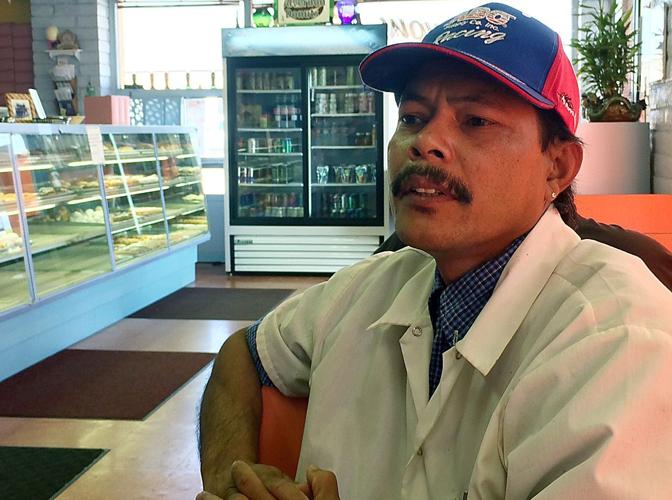Poe Kem starts to make the doughnuts around 1 a.m.
He opens the shop at 5 a.m. and doesn’t close until 5 p.m.
The sleeplessness is a pain, but Kem doesn’t consider it work, really.
“I see it as responsibility,” the 44-year-old told me over the counter at Alvernon Donut Shop, 1450 S. Alvernon Way. “With what we experienced in our life, this is no comparison.”
To understand, you have to go back 40 years and an ocean away, to Southeast Asia in the 1970s. The bloodthirsty Khmer Rouge took over Kem’s native Cambodia in 1975 and tried to transform the country through force into a classless rural society. Almost 2 million people were killed in less than four years.
Kem, whose father was a professor, remembers his family burning their identification documents and leaving the town where they lived. The family was forced to work in a rural area, and Kem’s job was to make fertilizer from cow dung, he said.
“We were skin and bones,” he told me. “We were just like Ethiopian kids, if you can picture that.”
For a year, he was essentially enslaved. One night, the family fled their barracks when gunfire raked their camp from across an adjacent river. Around then he turned 9.
Kem’s family eventually joined thousands of others in escaping westward, toward Thailand. They walked at night, even getting separated when an approaching flashlight on a trail forced them to scatter. Finally they crossed the border, were reunited there and arrived at Khao-I-Dang refugee camp. The Khmer Rouge fired shells across the border toward the refugees.
It was another year before they were approved to enter the United States. They flew to Hong Kong, then San Francisco, then Dallas, where members of a sponsoring church awaited them.
Now he’s making doughnuts in Tucson, running the shop with wife Nina and adult son Tony, as three younger kids come and go. But it’s not as unusual a path as you might think.
In California, Cambodian refugee families began taking over doughnut businesses soon after the Khmer Rouge was driven out of Phnom Penh in 1979. A man named Ted Ngoy started as a manager at a Winchell’s Donuts in Newport Beach, then bought a doughnut shop from a retiring couple and spun that into a statewide Cambodian-American doughnut empire, the Los Angeles Times reported in 2005.
Ngoy bought humble doughnut shops and leased them to other Cambodian refugee families, who learned the business and repeated the pattern. There’s no particular cultural connection between Cambodians and doughnuts — just a pattern Ngoy started that continues today in Tucson and across the West.
Kem’s family lived in Paris, Texas, for a couple of years, and he learned English there. That explains the unusual combination of accents in his fluent American English: A Texas drawl with a slight Cambodian clip to some words. Kem has accumulated an inventory of American expressions that he lets out regularly with his stories: “anyhoo,” “good to go,” “croaked.”
He had been working in a refinery in the Bay Area for about four years — a tough union job, he said — when Nina’s brother told them about a doughnut shop for sale in Tucson by a fellow Cambodian.
Neither of them had doughnut experience, but they had seen other Cambodians flourish in the business — and it sounded better than refinery work.
“It’s dangerous; the stench is horrible,” he told me. “Being in confined spaces, I’m not cut out for that.”
So in 2003 they came out to Tucson, borrowed money from family members and bought the shop. The owner said he’d stay for a month and train them, but he left after two weeks, Kem said.
From that point on, it’s been a matter of sleeping maybe six hours, getting up, making the doughnuts, experimenting with new recipes, and keeping a comfortable atmosphere for the many regular customers. The background music is gentle pop hits from the 1940s and 1950s.
One of the regulars is Tom Britt, who’s frequented the shop since about 1980 and saw it through different stages, including as a BoSa-branded shop.
“I’ve been coming here a long time, and never has it been such a nice place to be,” said Britt, 64. “Poe — people just love him.”





